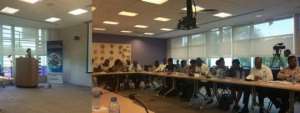
Civil Society Organisations (CSOs) in Ghana have highlighted some key areas of challenge for Ghana, which will inform the World Bank's new Country Partnership Strategy for achieving its twin goals of ending extreme poverty to boost shared prosperity.
Among several challenges that the World Bank's team had identified as being important focus areas for its future work in Ghana, the discussions with CSOs and Non-Governmental Organisations represented, highlighted the need to focus on addressing public sector inefficiencies, especially the role of accountability and provision of reliable information and developing agribusiness.
This followed a presentation of preliminary findings of the Systematic Country Diagnostic (SCD) being conducted by the Bank to inform its new strategy, the Country Partnership Strategy, which will replace the Country Assistance Strategy (CAS), at a consultative meeting with CSOs and NGOs held in Accra on Friday.
The preliminary findings also included; proposed three pathways for the achieving poverty reduction and shared prosperity in Ghana's future. They are quality labour-intensive growth, efficient public service provision and spatial equality and reduced vulnerability, with actions at micro and macro levels.
Ms Tomomi Tanaka, Senior Economist, Poverty and Equity Global Practice for Africa Region and co-author of the SCD, said the recurrent areas raised throughout the four meetings that had been held this week, were education and skills, quality of public service; not just access, agribusiness and government effectiveness and corruption.
'These are the areas that we constantly hear that have the need for improvement. The preliminary report was more focused on access not quality, because quality is hard to measure,' she said, adding that that was what Ghana needed to achieve, especially in education and health.
Another area of focus, not covered in the preliminary findings and pathways, which were raised by the participants, was the need for Ghana to focus more the use of technology; particularly how it can be used to boost exports through online marketing and to foster access to finance; which was identified in the findings as a constraint to the private sector.
They noted the need for government and regulatory institutions to pay closer attention to this area and for the Bank's strategy to look at government's role in this regard.
Ms Kathleen Beagle, World Bank Programme Leader said the SCD was to look at the bigger picture of the history of the country's growth trajectory, where it is headed in the future and where the key places were that the Bank, government and other actors, should focus its policies and programmes to speed up both growth and poverty reduction.
'This document is not about the World Bank's performance in Ghana, or what it should do next year; it's the picture of Ghana, and we want it to the socio economic story of Ghana,' she said, adding that the Bank hope that the report would also be useful to a broader community than the only the World Bank.
GNA
By Belinda Ayamgha, GNA




 Whoever participated in the plunder of the state must be held accountable – Jane...
Whoever participated in the plunder of the state must be held accountable – Jane...
 A vote for John and Jane is a vote to pull Ghana from the precipice of destructi...
A vote for John and Jane is a vote to pull Ghana from the precipice of destructi...
 I’ll repay your abiding confidence with loyalty, understanding and a devotion to...
I’ll repay your abiding confidence with loyalty, understanding and a devotion to...
 ‘I’ve learnt deeply useful lessons for the future' — Serwaa Amihere breaks silen...
‘I’ve learnt deeply useful lessons for the future' — Serwaa Amihere breaks silen...
 I’m sorry for the embarrassment – Serwaa Amihere apologises for leaked sex video
I’m sorry for the embarrassment – Serwaa Amihere apologises for leaked sex video
 Dumsor: Matthew Opoku Prempeh not in charge of Energy sector – Minority
Dumsor: Matthew Opoku Prempeh not in charge of Energy sector – Minority
 Adu Boahen’s murder: Police arrest house help who was in possession of deceased’...
Adu Boahen’s murder: Police arrest house help who was in possession of deceased’...
 Akufo-Addo nominates Felicia Attipoe as Tema West MCE
Akufo-Addo nominates Felicia Attipoe as Tema West MCE
 Election 2024: I can't have someone I defeated twice as my successor – Akufo-Add...
Election 2024: I can't have someone I defeated twice as my successor – Akufo-Add...
